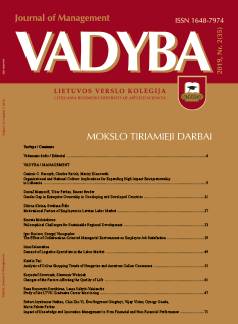ASSESSMENT OF CAUSES FOR STUDENT MOBILITY UNDER ERASMUS+ PROGRAM
ASSESSMENT OF CAUSES FOR STUDENT MOBILITY UNDER ERASMUS+ PROGRAM
Author(s): Samanta ŠtraupaitėSubject(s): Higher Education
Published by: Lietuvos verslo kolegija
Keywords: Erasmus+ mobility; studies; internationalization; expectations; motives;
Summary/Abstract: Studying abroad is an enriching learning experience through which students can meet new people and become actively involved in a new environment (Yang et al. 2011). Cultural distance between the host country and the home country can be a challenge for students, but this process can easily be facilitated when the language of the host country is communicated (Chirkov et al. 2007). In their study, V. Chirkov et al. (2007) found that little attention was paid to promoting students' motivation to study abroad and developing their cultural awareness, which could have helped them gain experience abroad. N. Rinehart (2002) explains that in their academic experience abroad, students are not only introduced to the host university's academic culture, but also face new social norms and the host culture's lifestyle. Thus, students are forced to step out of the comfort zone and adapt their abilities to different socio-cultural contexts in order to expand their abilities for intercultural communication and intercultural understanding (Singh 2013; Yang et al. 2011). It is important to know the strengths and weaknesses of all Higher Education institutions and their International Relations Offices - to know the students' reasons when choosing their city or institution, if they want to work effectively and receive the highest numbers of Erasmus+ students. This article analyses causes for student mobility under Erasmus+ program at one of Klaipeda Higher Education Institution. The article presents the reasons and motives of all incoming students that arrived by Erasmus+ exchange program in the 2018 / 2019 and 2019 spring semester in one of Klaipeda Higher Education Institution. Also we analyse students' interests and expectations before studying and motives to choose Lithuania and Klaipeda as a city for Erasmus+ studies. In our study we used qualitative methods – interviews, statistical analyses, comparative analyses and literature review. Our subjects were students coming to one of Klaipeda Higher Education Institution under the Erasmus+ program. The relevance on the article that we noticed changes in the number of incoming Erasmus+ students in the spring semester of the 2018-2019 academic year to one Klaipeda Higher Education Institution. Since the incoming Erasmus+ students number is one of the important indicators of the Higher Education Institution’s activity, it is important to clarify the factors and expectations of incoming Erasmus+ students. The research reveals the causes for student mobility under Erasmus+ program.
Journal: VADYBA
- Issue Year: 36/2020
- Issue No: 1
- Page Range: 39-45
- Page Count: 7
- Language: English

